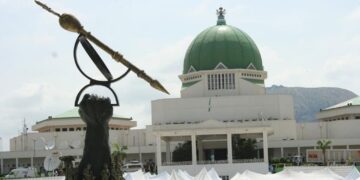[ad_1]
Collins Nnabuife|Abuja
THE Economic Community of West African States (ECOWAS) has convened more than 100 experts to discuss and draw a road map for the utilisation of the results in the view of adopting a sustainable management of the fisheries resources of the ECOWAS maritime domain.
The meeting tagged ‘Improved Regional Fisheries Governance in Western Africa (PESCAO)’ is funded by the European Union (EU), while FAO provides technical support.
These experts are representatives of the Directors of Fisheries and aquaculture, research institute, development partners, non-state actors, European Union, African Union, USAID, and FAO.
FAO, Institut Agro, and the University of Portsmouth respectively are leading the projects that make up Component 3 of PESCAO.
Throughout their assignment under PESCAO they have improved collaboration between fisheries research and fisheries actors, boosting knowledge of fisheries, its data systems and its management across West Africa.
In his remarks, the FAO Representative in Nigeria and ECOWAS, Fred Kafeero said workshop is aimed at sharing the outcomes of Component 3 and ensuring deserved level of visibility of the PESCAO programme.
He said the role and importance that ECOWAS attaches to fisheries development, fisheries management and the promotion of regional cooperation demonstrates how countries must take a leading role and set narratives in sustainable fisheries governance in West Africa and beyond.
He commended the European Union (EU) and the European Commission for the support in promoting sustainable fisheries development in West Africa and their commitment to the region’s fishery capacity development and fishing communities.
“Since 2018, the three complementary components of PESCAO Programme have offered benefits to the region with enhanced contributions of fisheries resources to sustainable development, food security, and poverty alleviation across West Africa. These include:
“The Demersal Ecosystem project (DEMERSTEM), through the Institute Agro is a collaboration between ten research institutions that aims to support and improve the production of scientific advice on the status of important demersal species stocks.
“The Fisheries Management and Resilience of Small Pelagics in West Africa project (GREPPAO), under the University of Portsmouth focuses on economic and social issues associated with critical small pelagic fisheries and communities in West Africa.
“The Fishery Committee for the Eastern Central Atlantic, CECAF-PESCAO project, under FAO framework supports West African countries in improving fisheries management advice, knowledge exchange and advancing knowledge on the small-scale fisheries sector”, he said.
Kafeero who was represented by the Head of FAO Nigeria, Northeast Office, Mr Al Hassan Cisse said the state of fisheries in the ECOWAS region is complex and varies depending on the country and the sub-region.
He said yet, fish which a source of income for millions of people faces enormous pressure and threats of overexploitation; illegal, unreported and unregulated (IUU) fishing; poor management practices that cripples our progress towards sustainable fisheries; especially the Small-scale fisheries sector, the back-bone of our fishing communities, we must do more.
He however, reaffirmed FAO’s commitment, and that of its partners of L’Institute Agro and the University of Plymouth to continue technical support towards sustainable fisheries in the region.
Programme Officer, Regional Co-operation Section of the European Union Delegation to Nigeria, and ECOWAS, Urszula Solkiewicz, said “As I am speaking to a community of fisheries’ experts, you will agree that a typical marine ecosystem is a dynamic and complicated network of natural populations, sometimes spread over tens of thousands of square meters, continually changing due to unpredictable meteorological and marine environments.
“Livelihoods and incomes depend on how one is able to manage this complex and confusing environment.
“For this reason, it is important that its managers have the adequate knowledge of the ecosystems and the fishery to allow them to respond in management actions.
Providing practical and science-based approaches seems extremely important to guide the decision makers”
Solkiewicz said developed and implemented in close partnership with ECOWAS, the PESCAO programme has been effective in laying the foundations for supporting the a Western Africa Fisheries and Aquaculture Regional Policy, which now serves as a Roadmap to the community.
She therefore, said the three day Regional Meeting will enable the policy makers to meet the scientists in order to discuss what has been delivered and how those results should be later utilised at the national and regional level.
Throughout the 4 years of the project, fisheries science partners from Mauritania, Senegal, Guinée Bissau, Guinee, Côte d’Ivoire, Ghana, Spain, Italy and France participated in meetings and long training sessions, physical and remote, to update regional knowledge on stock assessment process.
Amadou Tall, PESCAO Programme Team Leader said that “by leveraging the expertise of the various institutions, regional organizations, and communities in the West Africa region, we set the narrative for fisheries governance and ensure that these vital resources are managed sustainably across the ECOWAS maritime domain and beyond”.
READ ALSO FROM NIGERIAN TRIBUNE
[ad_2]





